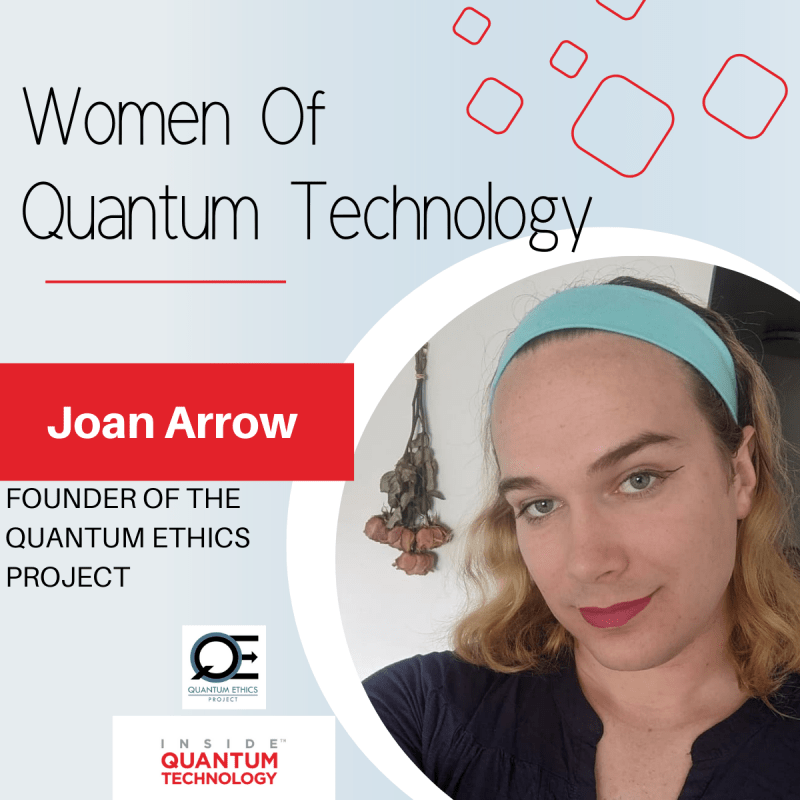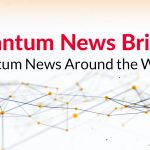Women of Quantum: Joan Arrow of the Quantum Ethics Project

As this article series highlights the inspiring women within the quantum computing ecosystem, we also touch on methods to make this ecosystem more inclusive for women and all underrepresented minorities. Unsurprisingly, this industry is heavily dominated by men, making it harder for women to feel included or accepted. With these articles, we try to offer up female role models and potential members in this community for other women to reach out to and connect with, hopefully making the space more inclusive.
No one has perhaps felt this isolation and lack of acceptance more than Joan Arrow, a trans woman and the founder of the Quantum Ethics Project. “I have somewhat of a unique perspective on particularly gender-based discrimination because when I entered grad school, I presented as a cis-gendered, heterosexual white man, for all intents and purposes,” she explained. “I enjoyed the privileges and kind of social credibility that that identity affords. And now I find myself, as presenting as a gender diverse person, that even on subjects that I consider myself to be an expert in, talking to someone who’s never thought about the subject that we’re discussing, I find myself having to debate fundamental things about my qualifications to be an authority on the subject.” Joan is not alone in this feeling, as many women throughout the industry feel that they are questioned more thoroughly than their male counterparts, making it harder for them to feel accepted and respected in the workplace. For Arrow, one of the few openly gender-diverse people within the quantum ecosystem, this feeling has been magnified since she transitioned.
That hasn’t stopped her however from pursuing a successful career in quantum physics. “So when I was maybe high school or middle school age, I was a big fan of people like Einstein and Stephen Hawking,” she stated. “Learning about quantum physics was one of my special interests growing up.”
Arrow earned her GED and attended Northern Arizona University to major in physics and mathematics. “When I got to university, and I was trying to find where I fit as an engineer, or a physicist, in an industry where I wanted to be able to give something back, quantum technology was really exciting.” After a summer research internship at Texas A&M, Arrow met her future research advisor and transitioned to the University of Waterloo, where she completed her Masters’s degree in Mathematics and Quantum Information with a research focus on quantum algorithms and quantum machine learning.
While doing her studies, Arrow decided to found the Quantum Ethics Project, a group specializing in the social, economic, and political impacts of quantum technology that was recently featured in the blog DeadCatLiveCat. “The basic idea is just getting back to those core values of wanting to make sure quantum really does transform society for the better,” Arrow added. Because quantum computing is predicted to give significant advancements to many different industries, from healthcare to supply chains to defense, ensuring this technology is used in an ethical way can help make the playing field more even between developed and developing countries.
For Arrow, this means her days are rather busy at the Quantum Ethics Project. “As of January 2023, I manage a team of five,” she said. “My team’s goal is to advance discussions on the societal implications of quantum technology by facilitating and promoting fundamental research in quantum ethics by helping researchers connect to collaborators, helping researchers connect to key resources, and to facilitate projects.” Arrow and her team then incorporate this cutting-edge research into the development of lectures, seminars, discussion workshops, and other educational content. “This connects to our education team, where we have two education specialists and myself developing workshop seminar materials, with the eventual goal of providing access to workshops on quantum ethics that are accessible to anybody.”
Through this process, Arrow and her team have already begun seeing success. “We’ve been actively collaborating with the Perimeter Institute for Theoretical Physics, where we delivered our first workshop in March, and we’re getting very good feedback on that,” she stated. “The Perimeter Institute is increasing its investment in our future collaborations.” Other supporters of the Quantum Ethics project include the Institute for Quantum Computing (IQC), the Center for Quantum Networks, and the Union of Concerned Scientists.
As one of the few gender-diverse individuals within this community, Arrow is hopeful that her representation within the ecosystem can help others feel accepted and included. “When we’re talking about setting up a future that’s equitable, and the people in the room discussing that future, are from all from one similar background, we’re going to have the same blind spots,” she stated. “So my personal philosophy is trying to find ways that we can prioritize helping to meet folks where they are and provide them with opportunities that make sense for their context. And also try to recognize the fact folks may have a number of battles that they have to face even before they’ve gotten the opportunity to sit down at their desk and start a project.”
Arrow hopes that the ecosystem can help meet the needs of others in every background and situation possible, not just those from a background of privilege. “The assumption that everybody’s starting the race at the same point with the same equipment just isn’t true,” she explained. “The students that I work with, some of them had difficulty reaching reliable internet, and some of them didn’t have personal computers. When you think of those basic pieces of infrastructure that some people may not have, you’re basically asking someone to finish a race with no shoes.”
Kenna Hughes-Castleberry is a staff writer at Inside Quantum Technology and the Science Communicator at JILA (a partnership between the University of Colorado Boulder and NIST). Her writing beats include deep tech, quantum computing, and AI. Her work has been featured in Scientific American, New Scientist, Discover Magazine, Ars Technica, and more.



















